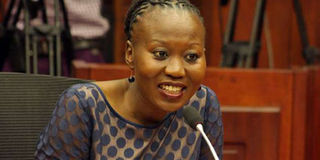IEBC drafts technology firms to help secure August 8 vote

IEBC Commissioner Roslyn Akombe. She has confirmed that the IEBC has drafted three technology firms to help protect the Kenyan vote. FILE PHOTO | DENNIS ONSONGO | NATION MEDIA GROUP
What you need to know:
Independent Electoral and Boundaries Commission said it had contracted IBM, Oracle and Dell to help it protect its systems during the election.
Elections have become a magnet for hackers, who try to break into computers to alter the outcome.
In December last year, hackers targeted Ghana’s electoral commission website and doctored results in the tight race.
In May, Botswana elections team invited hackers to attempt to hack into its system to test the firewall for its 2019 General Election.
Three technology giants have been drafted to help protect the Kenyan vote.
Independent Electoral and Boundaries Commission said it had contracted IBM, Oracle and Dell to help it protect its systems during the election.
IEBC commissioner Roselyne Akombe, who refused to name the firms, expressed confidence that the deal would ensure the highest forms of digital security for the election.
“They are using each other’s strengths to mount threats on our systems and ensure all possible attack loopholes are blocked and give assurance of the technology deployed,” Dr Akombe told Nation on Monday.
Dr Akombe, who also spoke about the integrity of the IEBC system at a breakfast meeting with ‘Mkenya Daima’ forum, said the contract with the three firms was multi-faceted.
SECURITY
“The technology partners are providing logical security for the electoral systems at various levels such as network, application, database and hardware on an end-to-end solution basis,” she said.
Elections have become a magnet for hackers, who try to break into computers to alter the outcome.
Intelligence services in the United States are adamant that Russia sought to influence the outcome of the November 2016 presidential election in favour of Donald Trump and against his main challenger Hillary Clinton.
State level electoral authorities in the US use old technology, which is feared to be vulnerable to sophisticated hackers.
At any rate, the Democratic campaign systems were penetrated and sensitive emails stolen and later used to hurt the Clinton campaign.
HACKERS
In December last year, hackers targeted Ghana’s electoral commission website and doctored results in the tight race.
The commission was compelled to clarify that the results were fake and urged the public to disregard them.
In May, Botswana elections team invited hackers to attempt to hack into its system to test the firewall for its 2019 General Election.
“The demonstration session will offer an opportunity for those with the know-how to disrupt, hack and compromise the secure performance of the machines to do so… All those with the technical capability to hack the EVM are invited to come forward and register,” the commission said.
CHALLENGE
Last month, India’s electoral commission set up a challenge for hackers to get access to their system as it sought to assure political parties and voters that its systems were safe.
This was part of the recommendations of audit firm KPMG which had said it was denied access to do the penetration tests, and that two default administrator passwords had not been changed.
Dr Akombe said the passwords had been changed.
IEBC has deployed 40,883 kits to polling stations and three backups for each of the 1,450 wards that will be deployed in case of failure, like it did in 2013.
Dr Akombe said IEBC would conduct a countrywide simulation of results transmission on July 31.
HELICOPTERS
She said the commission had helicopters at its disposal which could be deployed to any part of the country to assist commissioners and senior staff access all parts of the country.
“We expect only less than two per cent not to be identified biometrically, and at most five per cent. So if we find more in any polling station — like no identification in the morning then an unexplained surge in the afternoon — we will land there in a second and see what is happening,” said Dr Akombe.
BREACHES
If it fails, IEBC will resort to an alpha numeric search using IDs where all agents will sign that the said person could not be identified.
The commission warned its 360,000 temporary staff that they would be held personally responsible for any breaches of the law at polling stations.
To further guard against mischief in the polling stations, the commission has asked presiding officers to send periodic updates every three hours of the number of ballot papers issued.
“This figure must tally with the machine-generated number of voters who have been identified,” Dr Akombe told journalists at the Intercontinental Hotel.




